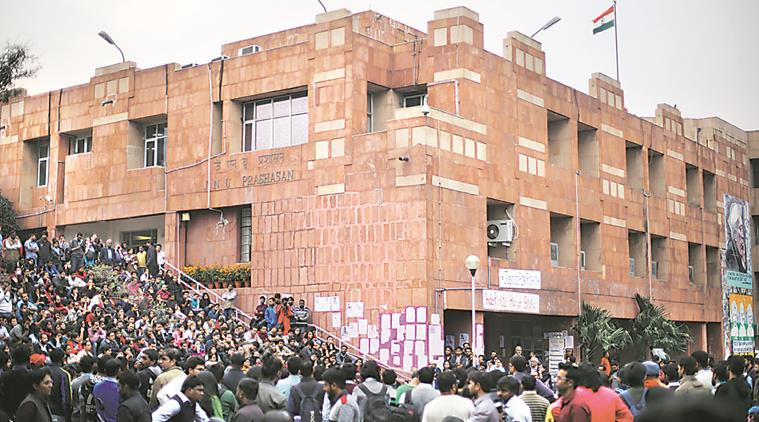Stay updated with the latest - Click here to follow us on Instagram
70 academicians from Ahmedabad varsities support JNU
The recent additions being three faculty members of the India Institute of Management, Ahmedabad(IIM-A) and one from the National Institute of Design (NID).
 Jawaharlal Nehru University.
Jawaharlal Nehru University.
Calling for an “impartial inquiry into the events that took place at JNU and Patiala House Court” in February, more members of the academic fraternity from Gujarat joined on as signatories this week in an open letter that expressed solidarity with the students of the Delhi-based university. The number of academicians from varsities in Ahmedabad, Gandhinagar, Surat and Anand rose to 70 this week.
The recent additions being three faculty members of the India Institute of Management, Ahmedabad(IIM-A) and one from the National Institute of Design (NID). Indira Hirway, director and professor of Economics at the Centre For Development Alternatives, who had initiated the discussion on the JNU row, said the list of signatories went from around 66 last month to 70 now with the addition of IIM-A faculty Kavita Rangarajan, Navdeep Mathur and Ankur Sarin and NID faculty Tanishka Kachru.
[related-post]
“In the letter, we have raised our concern about four things, including freedom of speech, freedom of dissent, autonomy of universities and misuse of law of sedition. We have also pointed out in the letter that shouting slogans should not amount to sedition and freedom to express dissent against the government is not anti-national and that no political party can define it. I felt this first and wrote to several colleagues of some nearby colleges and they responded. So, currently 70 people from different institutes have signed the letter,” said Hirway.
“I do believe that in an educational campus, freedom of speech is most important for young people as they are learning to express themselves. It is on campuses that students learn to develop ideas and that is what campuses are for,” said Tanishka Kachru from NID, who has recently signed the letter.
Kachru’s feelings were echoed by Gauri Bharat, who teaches at CEPT University. “My own sense is that a few individuals raising a debate within the confines of an institutional space came to be seen as threatening the nation as a whole, seems like something blown out of proportion. It speaks of a larger sense of vulnerability and insecurity in our society. Increasingly, we find that people are not being able to disagree with dignity and this signals of our inability to listen, discuss and accept a different opinion,” said Gauri Bharat (one of the signatories of the letter written by academics about the JNU incident), who is assistant professor at the faculty of architecture at CEPT University.
While IIMA, where a total of eight faculty members have signed the letter, has told the media that the views expressed in the letter are personal to the faculty, Jeemol Unni, director of the Institute of Rural Management (IRMA), Anand, said, “I have signed on the letter in a personal capacity and its has nothing to do with the institute. The letter talks about the freedom of academic institutions and I stand by that.”
Speaking on the importance of dissent on campuses, IIM-A’s senior faculty Rakesh Basant, who had signed on the open letter, said, “Not just campuses, all spaces should have a scope for dissent. Having different opinions is part and parcel of academic activity. If you don’t question, then you don’t learn.”
Representatives from government-aided institutes like Sardar Patel Institute of Economic and Social research (SPIESR), Centre for Social Studies (CSS) and the Gujarat Institute of Development Research (GIDR) were also part of this campaign. Dinesh Awasthi, who teaches at SPIESR in Ahmedabad, said, “Academic institutes must give you a leeway and freedom to think and discuss and these are the basics of any good academic institution. Discussions are benign and unless there are security concerns, students cannot plot against the government.”
“Basically, it was an initiative by one of the leading academicians in Ahmedabad and we all joined in as a mark of solidarity with the students of JNU,” said P K Viswanathan, an associate professor with GIDR, an organisation supported by the Indian Council of Social Science Research (ICSSR), New Delhi.
Viswanathan refused to comment further on the issue. Other signatories, like Satyakam Joshi, director of Surat-based CSS, an autonomous social science research institute supported by ICSSR and Government of Gujarat, refused to make any comment fearing further complications. “I do not want to make a fresh comment and complicate the issue,” said Joshi. Others signatories, like Dr Aditi Nath Sarkar from private universities like Anil Ambani-run Dhirubhai Ambani Institute of Information and Communication Technology (DAIICT), choose to remain brief. “We had just expressed our support for the students at JNU and we did not expect our names to figure in newspapers,” he said.







